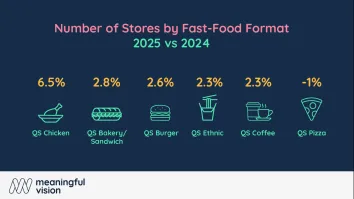What impact will changes to IR35 have on the restaurant industry?
John Deane of Gannons Solicitors offers his advice on what operators can do to manage the changes that will affect the industry from April 2020.
It’s a fact, the job market is changing across the restaurant industry. Workers are increasingly demanding greater flexibility across both payments and working arrangements.
The latest survey findings from YouGov support this claim, with 55% of employees stating they think more control over work and shift patterns would make them less likely to leave the industry. This is relatively good news at a time when, according to UKHospitality, the industry will face a recruitment deficit of upwards of 60,000 workers per annum from this year.
Managing a recruitment crisis means savvy restaurant operators have become extremely aware of the importance of nurturing and retaining their existing workforce. However, implementing a flexible culture within a business can prove to be quite the minefield, not least when it comes to correctly calculating tax payments and national insurance – and change is coming.
Employed or self-employed?
Identifying whether a worker is employed or self-employed enables an employer to understand the following:
- The different levels of legal protection afforded to employment compared to self-employment
- Whether tax is paid under Schedule E or D and whether National Insurance Contributions (NICs) are paid as a class 1 or class 2 contributor.
A worker might fall into one of three categories:
1. Employee: Direct employees under an open-ended contract with regular working hours pose no risk of tax exposure for the operator because they are on the payroll and the usual PAYE rules apply. An employee will, however, have the full benefit of the Employment Rights legislation.
2. Self-employed: Genuinely self-employed contractors also carry no tax risk for operators because the current law states they are responsible for their own tax. They will not have the benefit of Employment Rights legislation.
3. Worker: This is the middle ground. Many ‘gig economy’ workers, short-term contractors, freelancers, casual workers and some on zero-hours contracts have “Worker” status, which means they have some statutory employment rights, such as holiday pay and the National Minimum Wage. However, they are classed as off-payroll and not subject to PAYE.
Where employment is through an agency, the way to determine employment status is whether the worker is under the supervision, direction or control of the end-client (the operator). If so, all payments should be subject to payroll tax by the agency.
There is some guidance from courts and tribunals on whether, when a person is working for an operator, they are carrying on a business in their own right. HMRC also provides guidance on what it considers employed and self-employed. However, ultimately, it would be for a court or tribunal to decide. What creates anxiety for operators is the complexity of determining employment, self-employment and worker status, and the resulting uncertainty about financial liabilities.
A nagging question is whether self-employment can be disguised as employment. Can an arrangement the operator considers to involve self-employment (also documented as such) be successfully challenged in an employment or tax tribunal? The answer is yes. This means an operator might have unintended backdated payroll tax liabilities, penalties and interest. It means that where employment rights apply, an operator might face claims for unfair dismissal and payment of benefits, or experience a detrimental impact on the flexibility of hiring, firing and relocating. It also means the relationship an operator has with its workforce, the consumer and HMRC might be compromised.
In practice, all the facts have to be considered when determining employment status and a carefully drafted agreement ensuring the independence of the worker is a good starting point. Operators should regularly review agreements to assess the current situation, because an arrangement which started out as self-employment may become employment over time.
What changes are ahead?
IR35 is tax legislation introduced to prevent individuals from reducing their tax liabilities by paying an intermediary – usually their own personal service company (PSC) – between themselves and the employer. By paying themselves largely by way of dividends from their PSC, an employer’s NICs are substantially reduced and generally less tax is paid.
Understanding IR35 requires scrutinising the underlying nature of a worker’s relationship with an operator. If you remove the PSC, would the worker actually have been the operator’s employee? If the answer is yes, the income of the PSC is regarded as the worker’s earnings and is subject to tax and Class 1 NICs as their employment income.
Until now, the risk of an arrangement falling inside IR35 meant payroll liabilities would fall on the PSC and not the paying operator. However, in April 2017, responsibility for assessing engagements with PSCs working in the public sector shifted to the end-user operator. As a result, where arrangements between a public sector end-user operator and a PSC have the features of employment, the fee-paying end-user operator must account for tax and NICs under PAYE when paying the worker (including employer NICs). This means an extra cost for the end-user operator.
In 2018, the Chancellor confirmed that public sector rules would be extended to the private sector from April 2020, but with an exemption for small businesses. To qualify as ‘small’, a business must meet two of the following three requirements:
- An annual turnover of not more than £10.2m
- A balance sheet total of not more than £5.1m
- Not more than 50 employees.
What will non-exempt operators need to do from April 2020?
- Provide the ‘status determination’ they have decided, not only to the contracting party (a PSC or other intermediary, such as an employment agency), but also directly to the individual worker
- Account for tax and NICs under PAYE when paying the worker (including employer NICs)
Will this make operators more cautious when dealing with off-payroll workers who use a PSC? Most likely, yes.
Naturally, restaurant operators want to send out a positive message regarding their willingness to embrace flexible working, offering adaptable contractual arrangements to accommodate staff requirements. However, with the new regulations coming into force from 2020 for the industry, the important factor here is that operators understand where their obligations, responsibilities and potential liabilities start and conclude.
























